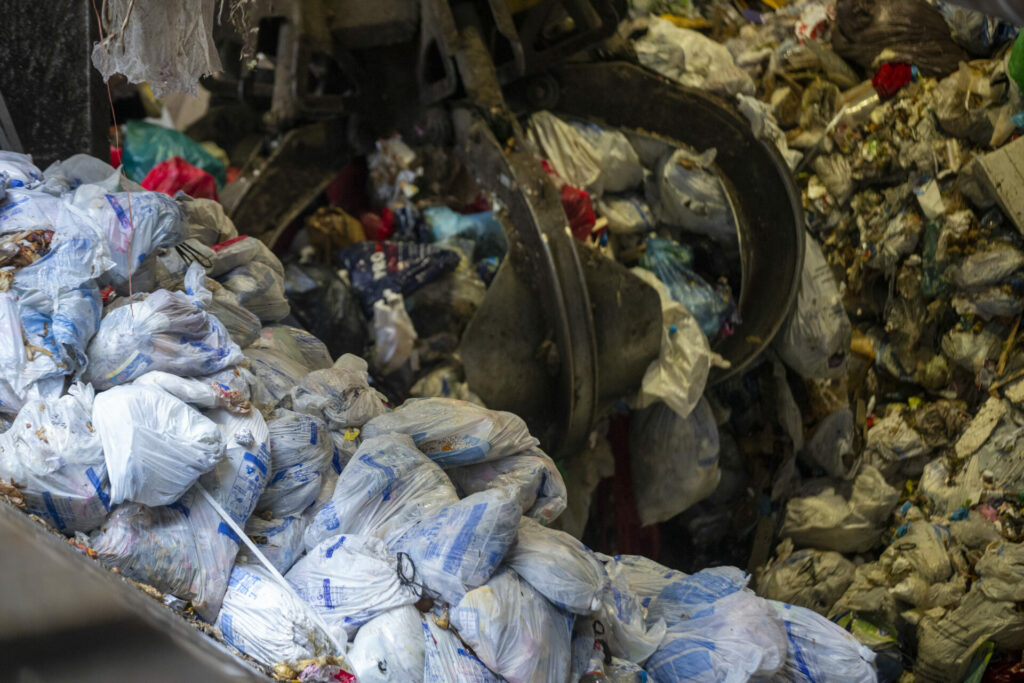Did you know that today heating logs are made with coffee grounds or that biofuel can be created from frying oil? Recycled food waste has been on the radar of those searching for alternative renewal energy sources for some time, but now viable solutions on a large scale are convincing some experts in the sector that the goal of 100% "zero waste" is achievable.
Food waste accounts for about 30% of what Europeans throw in the trash. These include vegetable peelings, leftover meat, and used frying oils. But increasing numbers of initiatives are being set up to save this waste and put it to good use. For example, at the Leclerc supermarket in Templeuve, near Lille, special bins for frying oils have been installed alongside those used to recycle paper or plastic bottles. Once a week, a vehicle from the Gecco recycling company comes to empty them, and the oils are transported to the treatment centre a few kilometres away.
Estimates suggest that 40% of used cooking oil comes from private individuals. And often, instead of taking them to the landfill, these oils end up in the sink. "Everything that is thrown into the pipe networks goes directly to the treatment plants,” Clémence Hanton, sales manager at Gecco, told RTBF. “This clogs the system and pollutes the waters, making it difficult to reuse it."
This pollution is costly to the environment and the community. With Gecco’s recycling system, instead of polluting the pipes, the oil is filtered and purified. It then passes into tanks where it is transformed into biofuel. "Our biofuel manufacturing process is 100% organic," said Hanton. “We add a biological enzyme to the filtered oils. At the end of the process, we have a product, biofuel, and a co-product: glycerine."
Anti-waste
Glycerine goes to the laboratories of the pharmaceutical industry. Biofuel is used in vehicles, especially those that collect food waste.
In France, the anti-waste law for a circular economy adopted in 2020 changed the situation. The law is gradually forcing companies, large and small, and individuals to recycle all food waste – with a system of penalties as an incentive. By 1 January 2024, all households will have to have a solution to recycle food waste.
Companies are responding to this requirement, especially in restaurants and canteens where a single composter is not possible, by inventing ecological products from their waste. The idea is that everything is transformed, and nothing is lost.
"Les Alchimistes" in Santes on the outskirts of Lille have decided to adopt a very local strategy: the company collects food waste from the restaurant industry within a radius of about twenty kilometres. After careful sorting, the waste is crushed and mixed with crate wood chips. After a few weeks, farmers in the sector can come and get compost from recycling, which costs them between €15 and €30 per tonne.
Related News
- Cosmetic sector moving away from plastic as refill sales boom
- Waste water: An untapped and sustainable energy source
- Experts sceptical on biokerosene as 'saviour' of aviation sector
The company has deployed micro-industrial processing units around major cities in France, with a real impact on the amount of waste buried or burned. "We work with just over 100 waste producers who previously put everything in the bin,” Foucauld Watine, director general of Les Alchimistes, told RTBF. “We are talking about 60 to 70 tonnes every month, which we collect. This would have been previously incinerated or buried. It is a material reused to feed the soil and also replaces quantities of chemical inputs or fertilizers. Everyone is a winner."
In Gecco's laboratory, biological lubricants are developed from frying oil for chainsaws, for example. Other wastes are carefully studied for their richness, such as coffee grounds: "What we are aiming for is the cascading recovery of coffee grounds," Research and Development Manager Abdulhadi Aljawish told the newspaper. First, phenolic compounds used in cosmetics are extracted and then enzymes used in the same industry are added. “Finally, as a third step, we can make biogas with our coffee grounds."
The so-called "cascading" recovery is a scientific answer to the search for 100% recycling and the goal of zero waste from businesses and homes: a goal that now seems within reach.

